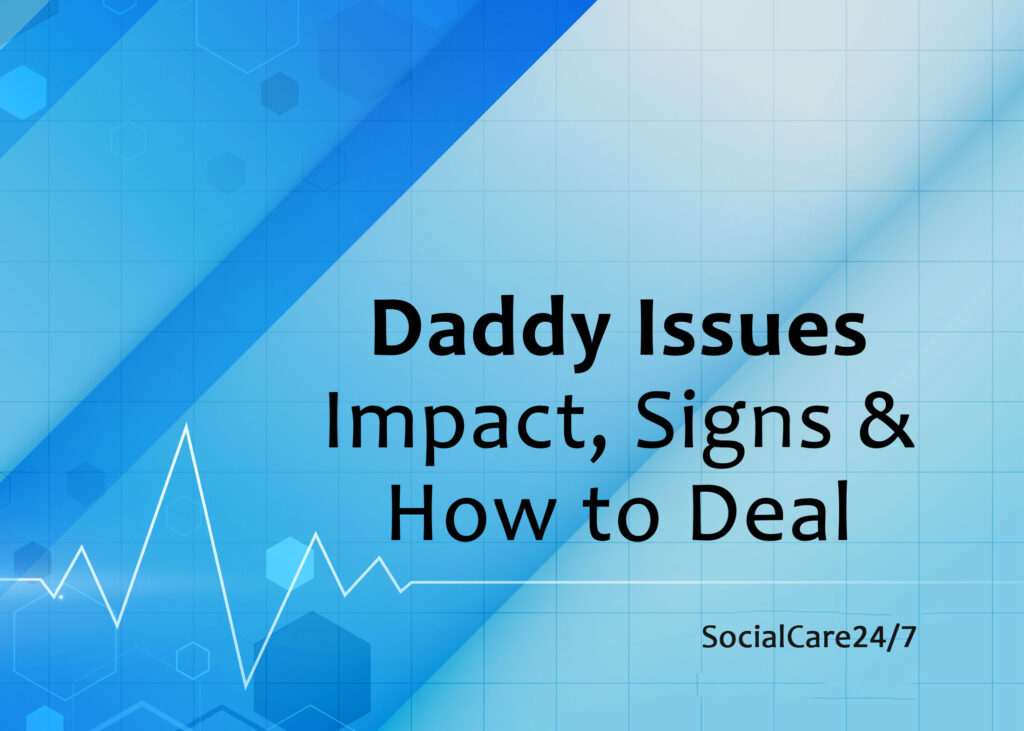“Daddy issues” is a common slang term for a range of mental problems that people have with their relationship with their father. The effect this phrase talks about can be powerful, even though it sounds weak. It can change how you feel about yourself, your relationships, and your growth.
Let’s talk about daddy problems, how they show up, and some good ways to deal with them.
What does it mean to have “Daddy Issues”?
When someone doesn’t get along with their dad or a father figure, they have “daddy problems.” This word doesn’t refer to a specific mental disease. Instead, it’s a catch-all phrase for a group of emotional issues that can arise from being abandoned, abused, or having a father who isn’t consistent with his care.
These problems can show up in different ways depending on whether the father was not there, not there mentally, or controlling.
Impact of Daddy Issues on Emotional Development
Fathers are crucial to children’s mental development. It can be hard to grow mentally if this relationship is tense or not there at all. Feelings of rejection, loss, or worthlessness may be behind your problems with your dad.
They might still think of these things as adults, which could change how they see themselves and interact with others.
Signs You May Have Daddy Issues
It’s important to find the signs of daddy problems to understand how they affect people. There are a lot of these signs:
To do with trust: Some people struggle to trust, especially in relationships.
Fear of Being Alone: People with this fear may need their partners too much or be too clingy.
Difficulty with Boundaries: Not being able to set and stick to healthy limits in relationships is another sign.
Wanting to Get Approval: Always trying to get support from adults or love partners can mean you still have problems. People who don’t have daddy issues are also likely to show these signs. They are often signs of greater mental problems.
How Daddy Issues Affect Relationships
People’s ability to create and maintain friendships and romantic relationships can suffer from Daddy’s difficulties. For instance, some people might seek mates substantially like their father, even if their dad has negative qualities.
Ignoring these emotions could cause problematic relationship patterns such codependency or not being emotionally present. They could even cause you to have a lot of bad relationships.
Role of Attachment Styles
Attachment theory says that our relationships with our parents as babies shape how we act around others as adults. The attachment styles of people who have issues with their dads are often unsteady. These styles can be worried, avoidant, or disorganised. Because they don’t want to be alone, people with anxious bonds may worry too much about being with their partner.
On the other hand, avoidant people might find it hard to connect with others and would rather keep their own space. If you know your attachment style, you can figure out what role daddy problems play in your ties.
Daddy Issues in Men and Women
When someone hears the words “daddy issues,” most people picture women. Guys, though, can experience the same problems. Men who lack a father or feel distant from one may find it difficult to manage their emotions, feel good about themselves, and commit to relationships.
Regarding ladies, what about? They may seek relationships with older guys or powerful men if they wish men to validate or approve of them. It can be negative for boys and girls if a parent and child do not get along.
How to Begin Healing from Daddy Issues
Seeing that you still have issues from your past with your dad is the first and most important thing you need to do to start healing. Therapy helps many people heal from childhood mental scars. Effective treatments include CBT. CBT helps people recognise and alter negative thought habits.
This lets them think about what they think about their relationships and themselves. Another way to deal with and let go of feelings that have been building up is to write in a diary, meditate, and think about yourself. Writing in a journal is a powerful way to express yourself because it lets you think and feel about your dad.
Meditation helps people be more mindful by letting them stay in the present moment and understand their feelings. People can better understand their thoughts and heal mentally if they use more than one of these therapy methods at the same time.
Importance of Forgiveness and Self-Compassion
Forgive yourself and be gentle when overcoming daddy issues. This approach can be difficult and time-consuming. You don’t have to like their dad or agree with their background to forgive someone. Let go of anger and negative feelings instead. To release these feelings, forgive yourself and accept that a parent’s mental wounds are not your fault.
Self-compassion means being compassionate, understanding, and patient with oneself while they heal. People may feel more worthy and be able to move on without the past anguish, improving their relationships and lives.
Conclusion
In the above, we discuss everything about daddy issues. When people joke about “daddy issues,” they mean something severe to a lot of people. This trouble can alter how people see themselves, their friends and family, and their world. People who are still dealing with trauma from their fathers can start to heal by spotting the signs and understanding the effects of it.
To deal with daddy issues and make future interactions better and healthier, it’s important to be kind to yourself, learn about yourself, and go to therapy.



